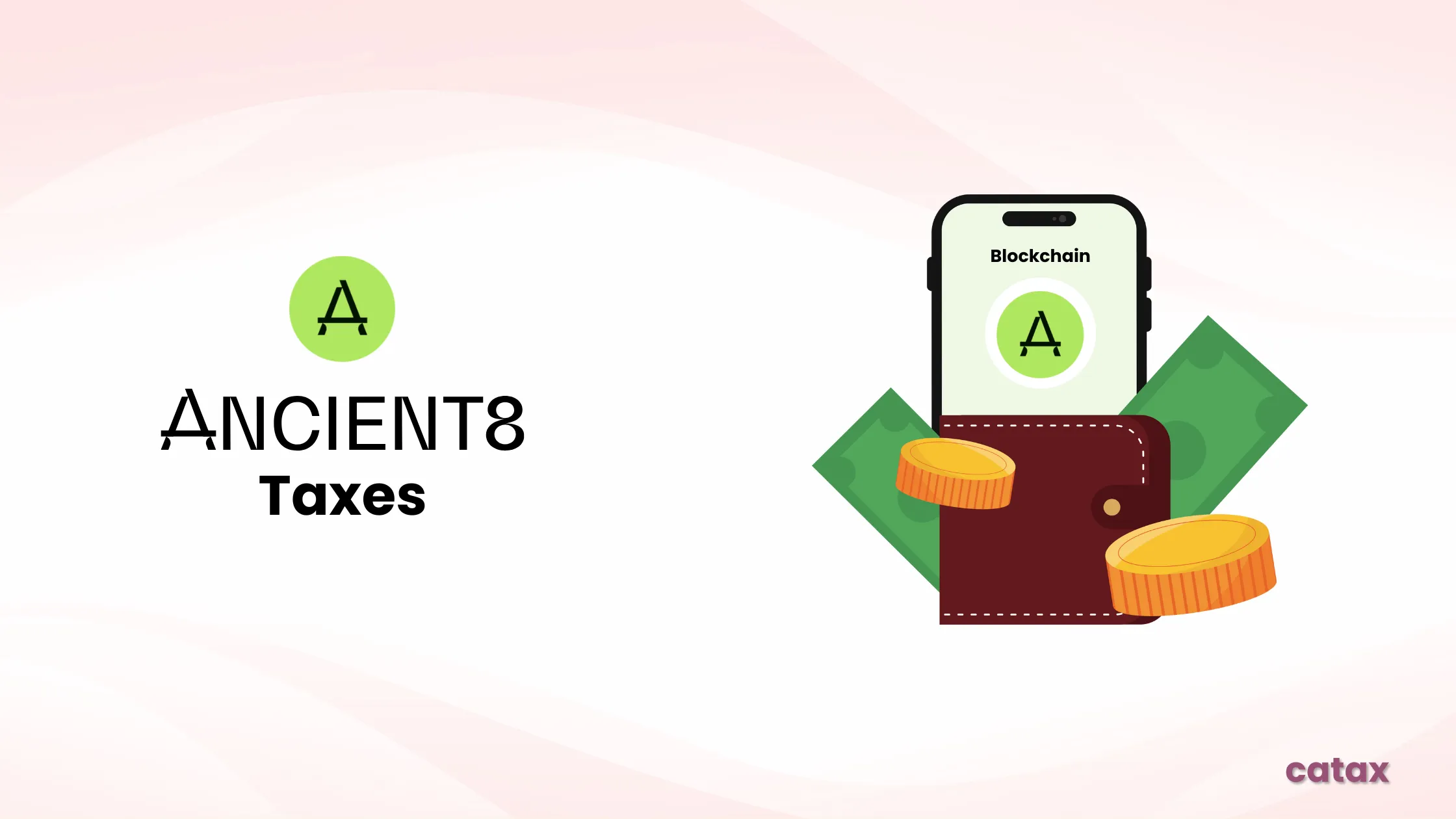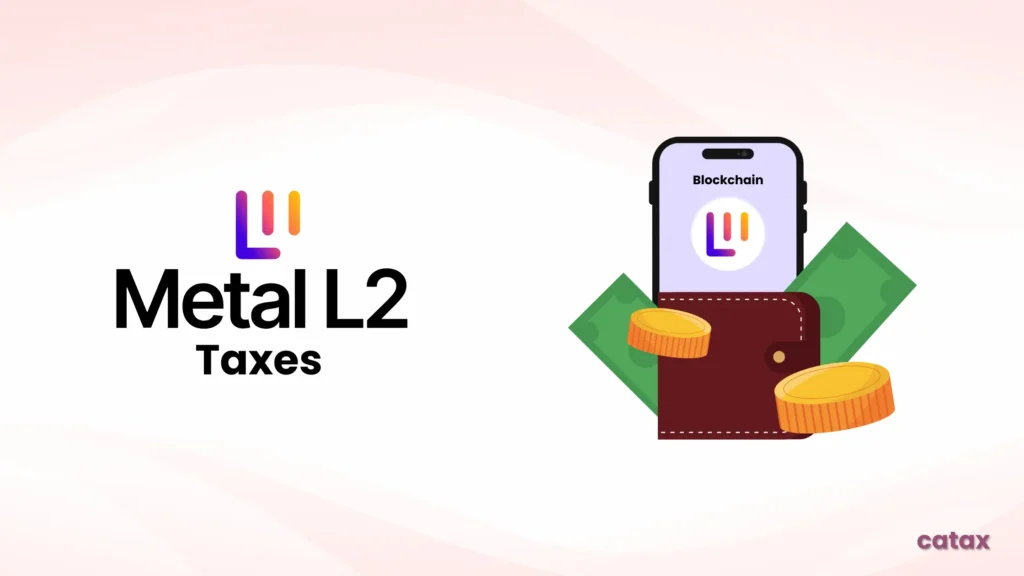Cryptocurrency tax rules vary by country, and Ancient8 (A8) taxes transactions may be taxed differently based on local regulations. Whether you buy, sell, trade, or stake A8, understanding how tax authorities classify these actions is key to staying compliant and avoiding penalties.
This guide simplifies Ancient8 tax rules, helping you manage your crypto taxes with confidence and remain aligned with legal obligations.

How to Connect Your Ancient8 Wallet to Catax?
To easily track your Ancient8 (A8) transactions and calculate taxes, follow these steps to connect your wallet to Catax:
- Open your Ancient8 wallet or use a supported block explorer (such as MetaMask, Ledger, or any compatible Ancient8 wallet).
- Copy your public wallet address from your Ancient8 wallet.
On Catax:
- Log in to your Catax account and select your country.
- Choose Chain, then search for Ancient8 Wallet.
- Paste your public wallet address and click Connect.
Once connected, Catax will automatically import your A8 transactions and simplify your crypto tax reporting.
Calculate My Taxes ➤Are Ancient8 (A8) Transactions Taxable?
Yes, in most countries, Ancient8 (A8) transactions are taxable. Depending on how you use A8, tax authorities may classify it as a capital asset, property, or income.
When Do You Have to Pay Taxes on Ancient8 (A8)?
You may be liable to pay taxes in the following situations:
- Selling A8 for a profit – If you sell A8 for more than you paid, the profit is typically taxed as capital gains.
- Trading A8 for other crypto – Swapping A8 for Bitcoin, Ethereum, or other tokens is generally treated as a taxable event.
- Using A8 for purchases – Using A8 to buy goods or services may trigger capital gains tax if the token’s value increased.
- Earning A8 through staking or rewards – A8 received this way is usually taxed as income at the time of receipt.
- Receiving A8 as payment – If you’re paid in A8, the amount is typically taxed as income, based on its fair market value when received.
Taxation rules may differ across jurisdictions—be sure to check your local crypto tax regulations.
Can You Deduct Trading Fees and Other Costs?
Whether you can deduct trading fees or other expenses related to managing A8 depends on your country’s tax laws.
In some countries, you may deduct:
- Trading fees when buying/selling A8
- Network (gas) fees for transferring A8 between wallets
- Security expenses like hardware wallets
Other countries may only allow:
- The original purchase cost (cost basis) without additional deductions.
Always consult your local tax code or a tax professional for accurate advice.
How Is Ancient8 (A8) Taxed Based on Holding Period?
Your applicable tax rate may vary depending on how long you hold your A8 tokens:
- Short-term (under 1 year) – Usually taxed at standard income tax rates.
- Long-term (over 1 year) – Some countries offer reduced rates on long-term crypto gains.
- Flat-rate systems – In some regions, a fixed crypto tax rate applies regardless of holding duration.
Understanding your country’s tax framework helps you plan better and reduce your tax burden on Ancient8 investments.
You can also check out our Country-Specific Guide for Crypto in Your country. This guide provides insights on regulations, tax implications, and compliance measures breifly explained for each country.
How Is Staking Income Taxed?
Staking Ancient8 (A8) tokens can generate passive income, but how that income is taxed depends on your country’s crypto tax laws. Some countries tax staking rewards when you receive them, while others only impose taxes when you sell or exchange the rewards.
How Countries Tax Staking Rewards
- Taxed as income – In many jurisdictions, staking rewards are treated as regular income. You’re taxed on the value of A8 tokens at the time of receipt, using standard income tax rates.
- Taxed as capital gains – In some regions, tax is only applied when you sell or dispose of the staking rewards. You pay tax on the profit between the value at receipt and the selling price.
If you’re staking A8, it’s essential to understand your country’s tax treatment—even if you haven’t sold the tokens yet.
Always review your national crypto tax rules before staking Ancient8 to avoid any unexpected tax liabilities.
Can You Claim Ancient8 (A8) Losses for Tax Benefits?
Not every crypto investment yields profit. If you sell A8 at a loss, you might be able to reduce your tax burden. Here’s how different tax systems approach crypto losses:
- Loss offsets – Some countries allow crypto losses to offset capital gains, so you’re only taxed on net profits.
- Loss carryforward – If your losses exceed gains, some regions let you carry those losses into future tax years.
- Limited or no deductions – In some countries, crypto losses aren’t deductible, meaning you won’t receive tax relief.
Keep accurate records of your A8 transactions to report losses properly and maximize any available tax benefits.
How to Stay Compliant with Ancient8 (A8) Tax Rules
As tax regulations around crypto continue to evolve, here’s how to stay on the right side of the law:
- Know how your country classifies A8 – Whether as income, capital gains, or business income, classification affects how you’re taxed.
- Understand allowable deductions – Know what you can deduct, including transaction fees, staking rewards, network fees, or storage costs.
- Keep complete transaction records – Log every A8 transaction—buying, selling, staking, transferring, or receiving rewards.
- Use a crypto tax platform like Catax – Catax automates tracking of your A8 transactions and makes tax filing easier.
- Consult a tax professional – Unsure about your crypto tax obligations? A tax expert familiar with digital assets can provide personalized guidance.
By staying organized and informed, you can confidently manage your Ancient8 tax responsibilities and avoid penalties or audit risks.
Book a Free Consultation Now →

